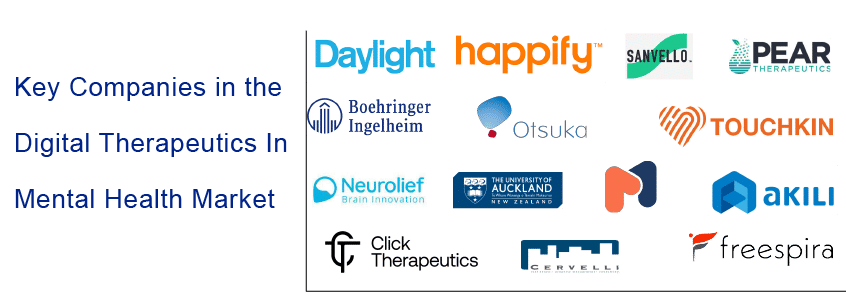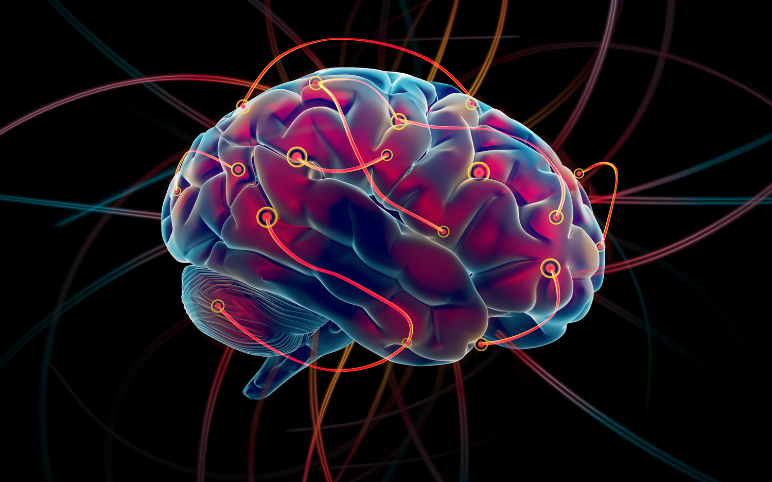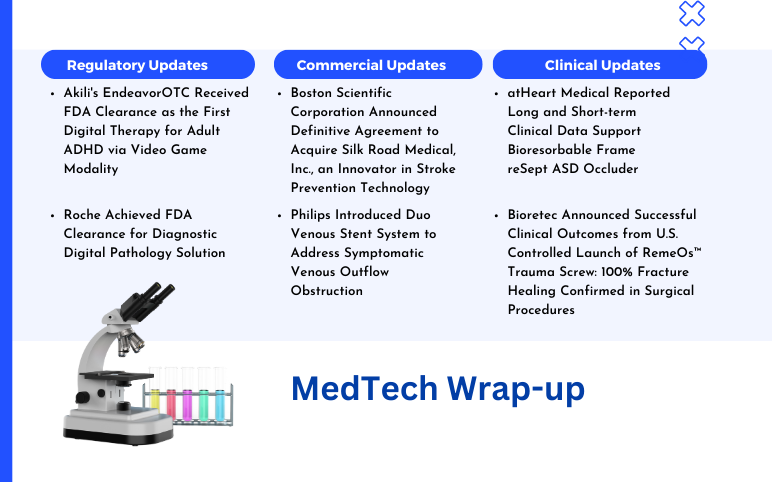Role of Digital Therapeutics (DTx) in Mental Health Management
Jun 15, 2022
Table of Contents
Over the last decade, various technologies, after being evaluated rigorously, have exhibited competence in treating mental health by becoming an extension of the already present care models. Today, the patient or user can now download a clinical-grade app on the phone, tablet, or computer and use it as a reliable mode of treatment for mental disorders such as depression, attention deficit hyperactivity disorder, insomnia, and others. This technology is referred to as digital therapeutics and has become instrumental in increasing access to mental healthcare worldwide. Digital therapeutics aid in delivering evidence-based therapeutic interventions to mental health patients that are carried forward by using high-quality software programs to manage, prevent or treat a medical disorder or disease. They can be used independently or incorporated alongside medications or other therapies to provide the best patient care and health outcomes.
Digital therapeutics (DTx) utilize the best possible practices related to design, advanced technology, clinically validated data, usability, and data security. While some digital therapeutics products must be reviewed by regulatory bodies like the US FDA to support product claims concerning safety, risk, efficacy, and the intended use, many products such as mobile medical apps don’t need the FDA approval as they don’t come under its regulation.
Downloads
Article in PDF
Recent Articles
- The Question That Remains Unanswered: What Might Be Causing Alzheimer’s?
- How to Cure Treatment-resistant Depression?
- Bioventus’s StimRouter Pain Management Device; FDA Approval for eCoin Therapy; SurGenTec Launches...
- Evaluating the Role of Digital Therapeutics as an Alternative to Conventional Therapies for Depre...
- 22 Healthcare Trends & Innovations to Watch in 2022 and Beyond
Growth of Digital Therapeutics
Although the term ’digital therapeutics’ was coined mainly in 2012, the idea of technological application to deliver care is not something new. Just at the beginning of the digital age, researchers started assessing different ways that advanced digital technology could be applied to various areas of human health. Over the past few years, several tech companies have developed software programs to support the treatment of numerous diseases and conditions.
By the end of this decade, the advancements in technology alongside the growing usage of the internet is expected to unlock the potential of digital therapeutics in patient care and health outcome to a much larger extent. Additionally, the rise in Investment and favorable policies by the government are also expected to make a huge impact on the Digital Therapeutics Market and the healthcare sector is anticipated to flourish with new opportunities. Many companies have successfully advanced their clinical development programs in the Digital Therapeutics landscape and are currently in the final stages of regulatory review and approval for their digital therapeutic products.

Digital Therapeutics for Mental Health Treatment
Several early advancements in digital therapeutics were for treating various conditions concerning mental health and substance abuse. So far, they have focused on several proven treatment needs, such as technology to offer patients information and advice, support monitoring and behavior modification needs, broaden access to motivational support, and provide real-time evaluations of cognitive function. They can also significantly increase the amount of data accessible from individual and whole patient groups, allowing for quicker and more effective changes to treatment regimens and approaches. Other benefits of digital therapeutics have been demonstrated, including allowing patients to determine the speed of their therapy better and monitor their own progress, as well as lower expenses, less need for in-person treatments, and greater privacy.
Currently, there are various digital therapeutics products available in the market for a wide range of mental health conditions. Some of the mental health conditions that are being treated with digital therapeutics are as follows:
Attention Deficit Hyperactivity Disorder (ADHD)
The standard of care for treating attention deficit hyperactivity disorder (ADHD) involves a variety of pharmacological and nonpharmacological therapies, many of which have limits and undesirable long-term risk profiles. Digital therapeutics have the potential to represent techniques in treatment that give increased patient access, fewer side effects, and a reduced risk for addiction while promoting gains in cognitive abilities such as attention. Significant study in this field has focused on using video games as a kind of pleasant therapy.
In June 2020, the FDA approved EndeavorRx by Akili Interactive, a game-based digital therapy device for treating ADHD in pediatric patients aged 8–12. This has mainly been advised for treating inattentive or combined-type ADHD patients who have shown an attention problem and is the first FDA-approved game-based therapeutic device for any condition. According to the FDA, this has improved attention as evaluated by computer-based testing. Moreover, Akili Interactive has also developed an interesting game, AKL-T01, which may serve as a type of treatment, lowering impulsivity and inattention while the child with ADHD plays. The FDA is currently reviewing the game. The game would be the first to be available only by prescription if approved.
Post-traumatic Stress Disorder
Post-traumatic stress disorder (PTSD) is serious and devastating, occurring after a traumatic experience such as combat, an accident, a violent personal assault, or physical trauma such as an explosion. Approximately 8 million persons are diagnosed with PTSD each year in the US, and it is anticipated that 7–8% of the US population will suffer PTSD in their lifetime. Sixty-seven percent of persons exposed to mass violence suffer PTSD symptoms.
In December 2018, Freespira Inc. (formerly Palo Alto Health Sciences, Inc.) gained FDA clearance for its flagship digital therapeutic, Freespira, as a treatment option for patients diagnosed with PTSD. Freespira is a drug-free 4-week treatment for PTSD, panic disorder, panic attacks, and other panic symptoms. Every day for 4 weeks, patients complete two 17-minute in-home sessions under the supervision of a registered healthcare practitioner. By training their breathing rate and exhaled carbon dioxide levels, the treatment assists the patient in stabilizing and normalizing aberrant respiratory patterns associated with these conditions. In a clinical investigation at the Veterans Administration Palo Alto Health Care System, the effectiveness of Freespira was assessed in veterans and non-veterans with PTSD.
According to the VA/DOD Clinical Practice Guidelines, medication is no longer recommended as first-line treatment for PTSD. Compared to exposure-based therapies, Freespira helps patients avoid reliving traumatic memories, which is typical in exposure therapy treatment while lowering the need for experts and the long-term time commitment required with that type of therapy.
Depression
Mobile health (m-health) digital treatment might be the game changer in overcoming treatment hurdles in depression and mental health. These novel therapy approaches have been scientifically verified and provide a fresh viewpoint on the patient’s experience and the ability to redefine standard treatment. In June 2021, Happify Health launched Ensemble, the first and only transdiagnostic prescription digital therapeutics for treating patients with major depressive disorder (MDD) or generalized anxiety disorder (GAD). Ensemble is an AI-powered digital mental health coach software that uses exercises based on cognitive behavioral therapy, mindfulness, and positive psychology to manage the symptoms of MDD or GAD.
Moreover, in November 2017, the FDA approved Otsuka’s first-ever drug-digital tracking tool hybrid, created in conjunction with Proteus Digital Health for the US digital therapeutics for the depression market. Abilify MyCite, an Otsuka digital therapeutics or digital pill, combines Proteus Digital Health sensor technology with a version of Otsuka’s best-selling mental health medicine Abilify, which is used to treat schizophrenia, bipolar disorder, and depression.
Furthermore, apart from these, several other digital tools are available in the market to help people cope with depression. These include mobile applications, wearable devices, internet-based self-guides, online games, and others. In addition, several MedTech companies are working in the market to help people with depression. The key companies developing digital therapeutics for depression are MindDoc Health GmbH, Happify, Otsuka, Sanvello Health, Roble Ridge Software LLC, Touchkin, Cervelli, Neurolief Ltd., infinite game, Auckland UniServices Ltd., and others.
Schizophrenia
Digital health technologies have a vast potential for severe mental illness, and they can be efficiently utilized to overcome the mental health treatment gaps. A significant number of people globally use smartphones, and for people with schizophrenia, digital therapeutics can improve schizophrenia symptoms. Schizophrenia is a disorder that affects a person’s ability to think, feel, and behave clearly. Digital health technologies or m-health can be used to manage their moods, monitor mental health symptoms, and receive digital treatments.
Similarly, studies conducted over the past few years have confirmed that implementing mobile cognitive behavioral therapy can be potentially beneficial in addition to standard antipsychotic medications. In 2020, due to the Covid-19 pandemic, the FDA loosened its regulations for digital psychiatric disorders devices. During that time, Pear Therapeutics had rolled out its new digital therapeutics tool called Pear-004, to treat schizophrenia. The tool uses multimodal neurobehavioral interventions combined with antipsychotic medications and can benefit the patient.
In September 2020, the Boehringer Ingelheim and Click Therapeutics joined hands to develop and commercialize CT-155, a novel prescription digital therapeutic to aid in treating schizophrenia. The ultimate aim is to help schizophrenia patients achieve certain positive clinical outcomes. As per the deal, Boehringer will acquire exclusive global rights to CT-155, and the Click Therapeutics will receive an upfront payment and development funding and is eligible to receive additional clinical, regulatory, and commercial milestones for a total deal value to Click Therapeutics of over USD 500 million, plus tiered royalties.
Substance Abuse
The use of harmful or hazardous psychoactive substances such as alcohol, cocaine, marijuana, stimulants, benzodiazepines, and opiates is referred to as substance abuse. The problem is growing at an unprecedented rate globally. Along with evidence-based behavioral or psychological management modes, several therapeutic medications are also available in the market to deal with substance abuse. Currently, many pharma giants are evaluating their potential pipeline therapies under different stages of clinical development.
In addition to medicational approaches, companies are also considering using digital therapeutics for substance abuse. For instance, Prescription digital therapeutics (PDTs) can be used as face-to-face counseling that uses cognitive-behavioral therapy (CBT) for individuals battling substance abuse. Digital Therapeutics-based CBT and contingency management are available 24/7.
Several MedTech giants and startups are working in the Digital Therapeutics for Substance Abuse space; however, only a few companies have received US FDA approvals. In the coming years, with the active participation of the key companies, advancements in technology, and rising awareness, several companies are expected to enter the Digital Therapeutics for substance abuse market.
Pear Therapeutics, a leading MedTech giant working on developing and delivering clinically validated software, has received de novo marketing clearance for its reSET® prescription digital therapeutic from the FDA. reSET® provides CBT as an adjunct to contingency management for patients with substance use disorder who are enrolled in outpatient treatment under the supervision of a clinician. The FDA approval has opened new opportunities for the companies that wanted to invest in Digital Therapeutics as a treatment option for SUDs.
Anxiety
Today, people utilize smartphones for diverse usages and almost every part of their lives. Now, the usage is broadening for mental health wellness as well, including anxiety. Globally, anxiety is one of the most prevalent disorders, affecting a significant proportion of the population.
Digital therapeutics (DTx), with its wide-reaching treatment tools, can offer a favorable and promising outcome in behavioral health treatment. The use of apps and software can help patients tackle anxiety. Additionally, it helps to stay compliant with exercises and keep their physicians informed.
Several DTx apps are available in the market to deal with anxiety. Happify is one of the leading apps in the anxiety segment that diagnoses and helps in managing generalized anxiety disorder. The app aims to increase positive emotions through exercises and games supported by positive psychology and mindfulness research. The activities in the Happify are backed up with a blurb about research or scientific rationale that the user is encouraged to read. It is observed that Happify’s original app has shown a 28.5% reduction in anxiety symptoms and long-lasting effects.
Another Digital Therapeutics option available in the market is Daylight. It is developed to manage anxiety. It is an evidence-based cognitive-behavioral therapy app developed by clinical psychologists and researchers. Daylight, with its structured, responsive program, has established that 71% of patients achieved clinical improvement in their anxiety in 10 weeks by spending just 10 minutes per day. Similarly, several other companies are evaluating the potential of evidence-based therapeutic interventions as an option for anxiety.

Digital Therapeutics Market Dynamics
Digital therapeutics can be used either independently or in combination with medications, devices, or other therapies. As per the available studies, the DTx is quite beneficial in optimizing patient care and health outcomes. The demand is rising significantly from the consumer side due to increasing awareness. With the advancement in technology, the efficacy and intended use of the DTx is expected to grow, especially for chronic and neurological disorders.
As per DelveInsight, along with other therapeutics areas, the global digital therapeutics market size for mental health is also anticipated to grow immensely in the coming years due to various factors such as technological advancement in the domain, the rising interest for the MedTech giants, and startups, favorable policies by the government, increasing funding in the domain for research and development activities, rise in the number of people suffering from mental health disorders, among others. In the coming years, along with the medication, the DTx is also expected to become a mainstream treatment option in the coming years in healthcare.
Despite several positive outcomes, the digital therapeutics market is expected to face some hindrances due to patient data safety, lack of awareness about digital therapeutics programs in developing countries, and resistance from traditional healthcare providers, among others.
The Future of Digital Therapeutics in Mental Health
The recently advanced digital therapeutics products are being developed to address the unmet needs experienced in the mental health disease area. It is also anticipated that the market for digital therapeutics will rise exponentially in the coming years due to the rapid expansion of the healthcare sector, increasing development, rising investments, and technologically useful resources.
Digital therapeutics are all given clinical validation and meet the regulatory standards related to risk, safety, and efficacy. This supports the patient’s confidence and aid health care providers in their utility and reimbursement pathways. In addition, the rapid pace of new innovations in digital technology will be able to support the overall development of Digital therapeutics in an ever-expanding array of applications.

Downloads
Article in PDF
Recent Articles
- How Is Digital Therapeutics Reshaping the Future of Healthcare?
- J&J’s SPRAVATO Achieves Milestone with Monotherapy Approval in Depression Treatment
- Johnson & Johnson’s Tecnis PureSee lens; Sparrow BioAcoustics’s Stethoscope Software; Better ...
- VBL Therapeutics’ VB-111 (ofranergene obadenovec); BMS’s mavacamten (Camzyos); Merck’s KEYTRUDA; ...
- Psychedelic-inspired medicine – A wonder drug for generalized anxiety?



